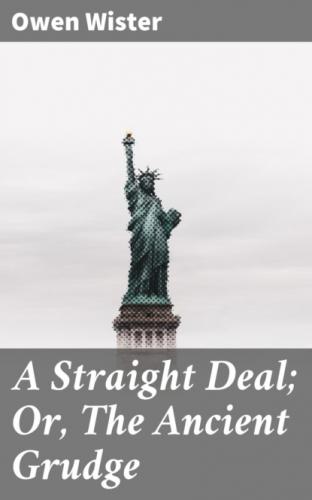Owen Wister
A Straight Deal; Or, The Ancient Grudge
Published by Good Press, 2019
EAN 4057664586438
Table of Contents
Chapter I: Concerning One’s Letter Box
Chapter II: What the Postman Brought
Chapter III: In Front of a Bulletin Board
Chapter IV: “My Army of Spies”
Chapter VI: Who Is Without Sin?
Chapter VII: Tarred with the Same Stick
Chapter VIII: History Astigmatic
Chapter IX: Concerning a Complex
Chapter XI: Some Family Scraps
Chapter XII: On the Ragged Edge
Chapter XIV: England the Slacker!
Chapter XV: Rude Britannia, Crude Columbia
Chapter XVI: An International Imposture
Chapter XVIII: The Will to Friendship—or the Will to Hate?
Chapter I: Concerning One’s Letter Box
Publish any sort of conviction related to these morose days through which we are living and letters will shower upon you like leaves in October. No matter what your conviction be, it will shake both yeas and nays loose from various minds where they were hanging ready to fall. Never was a time when so many brains rustled with hates and panaceas that would sail wide into the air at the lightest jar. Try it and see. Say that you believe in God, or do not; say that Democracy is the key to the millennium, or the survival of the unfittest; that Labor is worse than the Kaiser, or better; that drink is a demon, or that wine ministers to the health and the cheer of man—say what you please, and the yeas and nays will pelt you. So insecurely do the plainest, oldest truths dangle in a mob of disheveled brains, that it is likely, did you assert twice two continues to equal four and we had best stick to the multiplication table, anonymous letters would come to you full of passionate abuse. Thinking comes hard to all of us. To some it never comes at all, because their heads lack the machinery. How many of such are there among us, and how can we find them out before they do us harm? Science has a test for this. It has been applied to the army recruit, but to the civilian voter not yet. The voting moron still runs amuck in our Democracy. Our native American air is infected with alien breath. It is so thick with opinions that the light is obscured. Will the sane ones eventually prevail and heal the sick atmosphere? We must at least assume so. Else, how could we go on?
Chapter II: What the Postman Brought
During the winter of 1915 I came to think that Germany had gone dangerously but methodically mad, and that the European War vitally concerned ourselves. This conviction I put in a book. Yeas and nays pelted me. Time seems to show the yeas had it.
During May, 1918, I thought we made a mistake to hate England. I said so at the earliest opportunity. Again came the yeas and nays. You shall see some of these. They are of help. Time has not settled this question. It is as alive as ever—more alive than ever. What if the Armistice was premature? What if Germany absorb Russia and join Japan? What if the League of Nations break like a toy?
Yeas and nays are put here without the consent of their writers, whose names, of course, do not appear, and who, should they ever see this, are begged to take no offense. None is intended.
There is no intention except to persuade, if possible, a few readers, at least, that hatred of England is not wise, is not justified to-day, and has never been more than partly justified. It is based upon three foundations fairly distinct yet meeting and merging on occasions: first and worst, our school histories of the Revolution; second, certain policies and actions of England since then, generally distorted or falsified by our politicians; and lastly certain national traits in each country that the other does not share and which have hitherto produced perennial personal friction between thousands of English and American individuals of every station in life. These shall in due time be illustrated by two sets of anecdotes: one, disclosing the English traits, the other the American. I say English, and not British, advisedly, because both the Scotch and the Irish seem to be without those traits which especially grate upon us and upon which we especially grate. And now for the letters.
The first is from a soldier, an enlisted man, writing from France.
“Allow me to thank you for your article entitled ‘The Ancient Grudge.’ … Like many other young Americans there was instilled in me from early childhood a feeling of resentment against our democratic cousins across the Atlantic and I was only too ready to accept as true those stories I heard of England shirking her duty and hiding behind her colonies, etc. It was not until I came over here and saw what she was really doing that my opinion began to change.
“When first my division arrived in France it was brigaded with and received its initial experience with the British, who proved to us how little we really knew of the war as it was and that we had yet much to learn. Soon my opinion began to change and I was regarding England as the backbone of the Allies. Yet there remained a certain something I could not forgive them. What it was you know, and have proved to me that it is not our place to judge and that we have much for which to be thankful to our great Ally.
“Assuring you
